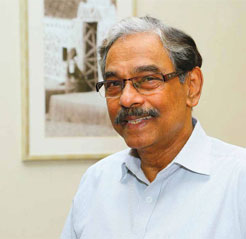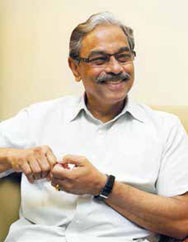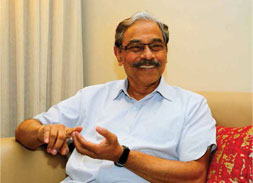
SUNIL DESHMUKH, USA based philanthropist and former corporate leader of Wall Street speaks at length to Corporate Citizen on his admirable journey from a student in the USA pursuing Masters in Chemical Engineering to his passion of social crusade through the Maharashtra Foundation Social Service Awards that he established two decades back, to recognise social reformers in India
My background is anything but glamorous-I come from a very lower middle class family from Sangli, a town in West Central Maharashtra. My father’s salary was a mere Rs. 500 per month. I stood fourth in the State Secondary School Certificate (SSC) exam and yearned to be a lawyer. But my father told me, “Look, we have no money to eat, so you have to earn your own bread. Lawyers kill flies, so you should become a doctor or an engineer”. I was afraid of seeing human blood, so the only alternative left for me was to do engineering. Now, which branch of engineering to pursue? There were rumours that chemical engineers earned Rs. 50 per month more than mechanical engineers, so I went for chemical engineering. So, this is the story of how I planned [!] my career.
I did my Chemical Engineering from Mumbai’s Institute of Chemical Technology (UDCT). During those days, all graduates of IITs and UDCT, like a train going through the tunnel, came out at the other end in the USA. That’s how I did my Masters in Chemical Engineering from Cleveland State University followed by a MBA from Indiana University. Again, nothing spectacular there.

I started working for Exxon Oil Refinery as a Chemical Engineer. Here, I did two things that are unusual in life compared to the rest of them. First, I quit Exxon and went to a law school in the USA. In 1977, not too many Indians went to law school. In fact, it was unheard of-partly due to lack of fluent English, and partly because of the accent. Although the American democracy is known to be “of the people, by the people, for the people”, it is actually “of the lawyers, by the lawyers, and for the lawyers”. Lawyers control every aspect of life here. I wanted to join the winning team and also fulfil my childhood dream of becoming a lawyer. I did law and with this unique engineering, business and law combination, I joined British Petroleum (BP) in their US headquarters in Cleveland, Ohio. I did a phenomenal job for them because 95% of lawyers in US have either English or Philosophy as their basic degree, but very few have technical background. Any legal matter in an oil company has the underlying subject matter that is technical, which I knew very well. As a result, they put me on a Fast Track Internal Program where they train and rotate you through various assignments, as you are considered among the future leaders of the company. As a part of that, they made me an oil trader which means I was trading crude oil for BP. Until then, I did not even know that something like oil trading existed. I did this for a couple of years. This is another unusual thing I dabbled into and I really liked it. My counter parties in oil trading were Goldman Sachs, Morgan Stanley and the likes on the Wall Street. Somehow, Goldman people liked me and called me for an interview. Robert Rubin, the Managing Director of Goldman (who later became the Treasury Secretary of US), interviewed me. He sat for one hour and at the end of it, made me an “offer I could not refuse” so to speak. I was really naïve and at that time Wall Street was a highly secretive club. They gave me a huge salary jump. Even then, I was not sure, because I had a phenomenal career path guaranteed in BP where I would have ended up being at least a VP or Senior VP in due course. Should I then go for Wall Street and risk this assured path by joining a risky career like commodity trading? By the way, I didn’t even know such a thing called “bonus” and Wall Street bonuses are really massive–you get a base salary, but the bonuses can be 200-2000% of the salary. Wall Street is a different world. It is a win-lose game; there is no win-win. You win, they give you a big bonus; you lose, and in six months you will be immediately sacked. So I took that risk. That is commodity Futures and Forwards trading what they call here as ‘leedho deedho dhanda’. I took one risk deviating to go to law in American context and the second risk was to opt for Wall Street where, it’s a high risk-high reward game. Even then, I joined Goldman and later Dreyfus which approached me a couple of years later. By then, I had figured out what bonus was. They paid me well.
Louis Dreyfus Energy is one of the biggest commodity traders of the world. It is a French Jewish company, about 140 years old. I spent eight years there and was the head of oil trading. We made huge amount of money in 1992 Gulf War in oil trading and they paid me good bonus. At that time, I indeed thought about retiring to do social work. But, I had friends in Citibank who persuaded me to come and start commodity trading for them. I did that for two years. I was the Global Head of Commodity Trading for Citibank. Now, the question is why at the age of 45 and the peak of my career would I quit?
In 1994.
Yes, completely. Right from my student age, I was always socially conscious and I wanted to do something for the society. There is more to life than chasing money and I wanted to do a good turn, both for the society over here in India and also in America, as it is my karma bhoomi; my kids are born there. Hence the conscious decision to quit. I have been doing charitable work pretty much full time for the past 22 years except for couple of consulting assignments. If you work for five years on Wall Street, you are all set for life. You are not rich but you are well set for couple of generations. Wall Street gives you that freedom and I am grateful for it.
“I started working for Exxon Oil Refinery as a chemical engineer. Here, I did two things that are unusual in life compared to the rest of them. First, I quit Exxon and went to a law school in the USA. In 1977, not too many Indians went to law school. In fact, it was unheard of—partly due to lack of fluent English, and partly because of the accent. Although the American democracy is known to be “of the people, by the people, for the people”, it is actually “of the lawyers, by the lawyers, and for the lawyers”. Lawyers control every aspect of life here “

You have one life to live and you have to live it well-I don’t believe in re-birth. Life is a matter of balance. You should do good for the society and also have fun. My definition of fun is not that unique. I love very rare single malts, gourmet food and travel. At the same time, I am also enjoying doing good for the society. I am working on environmental causes in the US and for secularism–separation of Church and State. I strongly believe in social justice and am a global citizen. I am an atheist and know that religion and God are the concepts created by the ruling classes to subjugate women and weaker sections of society.
Intellectual and artistic pursuits. I love Ghazals and am a keen student of cosmology. I think cosmology is the cutting edge science that answers the most fundamental questions of creation and the future.
Miami Beach, Florida. With blue ocean and warm weather, good food and fun loving people, it’s close to paradise.
No. My wife Pratibha is originally from Vile Parle, Mumbai. My father-in-law Dr Keshav Tilak is settled in Toronto, Canada.
Three children.
Girish is 40. He is a financial advisor with Strategic Wealth Partners in Cleveland, Ohio. He is married and we have two most beautiful granddaughters, aged five and seven. My middle daughter Nisha, is a lawyer. She went to Wharton School of Business and later did law. She is the Director of Marketing for a hedge fund in New York City. And our youngest son Sushil is a doctor. He is doing a Fellowship in Nephrology at Georgetown University in Washington, DC.
The credit goes to Pratibha, as she is not money minded at all. She is not into jewellery and other fancy stuff. In 1992, I launched the Maharashtra Foundation Awards for Progressive Literature and Social Service. I donated two crore rupees for establishing the awards. In 1992, I could have bought a good flat in Malabar Hill for that amount and it would have been worth several crores of rupees today. You need a like-minded partner to make the conscious decision to part with that kind of money and much more that I have donated for various progressive (Purogaami) causes.
“I donated two crore rupees for establishing the awards. In 1992, I could have bought a good flat in Malabar Hill for that amount and it would have been worth several crores of rupees today. You need a like-minded partner to make the conscious decision to part with that kind of money and much more that I have donated for various progressive (Purogaami) causes”
The credit also goes to my socially oriented nature which I inherited from my mother and my uncles who were very generous towards social causes. I have a progressive mind-set-we call it ‘purogaami’. There are two types of charitable work. One is of the welfare kind which is ‘kalyan kaari’ and the other is bringing in change through social reform or ‘parivartan vaadi’. Ninety nine per cent of donors do ‘kalyan kaari’ work-give food, money, clothes and so on. This makes you feel good and the receiver also feels good. It sustains society for a day but doesn’t change it. If you really want to change the society, then social reform is the answer as you have to do something deeper like fighting against corruption, dowry, superstition, caste system, and evil social customs and so on. Women’s empowerment is one of the most powerful ways of social reform because the old and conservative societies like to suppress and subjugate women. Until women get education and are empowered, their self-esteem will continue to be low. Even religion and god are used as instruments of control by the fundamentalists in India to deny justice to the lower classes and women. Anything that raises their self-esteem and empowers women is great; so I started these awards to recognise social workers, particularly working on women’s empowerment.
Social reform work is always an uphill battle. For example, If I go to my village and start giving dollars and Polo T-Shirts, they will think that is crazy, but I will be welcomed. But if I stand in the same place and say “don’t drink, don’t beat-up your wife, let your daughter go to school and don’t break people’s heads over caste and religion”, they will beat me up. So, changing entrenched mind-sets in a conservative society is very hard. That is the type of social work I promote.

Yes, this is 23rd year. We have the corpus and awards are given out of the interest that we get on it. We give away nine awards per year. Lifetime achievement awardees received Rs. 2 lakh and Rs. 1 lakh is given for social work in various fields. The award ceremony is held in Pune and awards are finalised by a recommendation committee comprising very knowledgeable people here. Then, we have the final selection committee in the USA. The process is very thorough and very transparent.
Businessmen in USA are unique. There is fair competition but creativity, merit and honest work are always rewarded. They work hard and give back generously. Not only the likes of Bill Gates, George Soros, Warren Buffet, Howard Schultz, Mark Zuckerberg who have given 99% of their wealth as charity, but 90% of all American businessmen give over 50% of their wealth to charity. Majority of businessmen in USA are progressive-most of them are socially liberal and global in their outlook. Charity and social good is thus in the DNA of US businessmen.
In sharp contrast, majority of Indian businessmen, with notable exceptions like Azim Premji, Narayana Murthy and a few others are taking from the society but not giving back. I have a very low opinion of their ethos. I measure greatness and success not in terms of how much one makes or has, but in terms of how much one gives. On that count, Indian businessmen rank very low. A good example that I can cite is when Bill Gates came to India to sign up rich businessmen for his “Giving Pledge”, he had very few takers! Some of them claim to give away black money “secretly” or build temples as charity. That makes them look ridiculous.
Are the Indian businessmen really happy? I often see vicious family feuds over money and constant scurrying around to curry favours with the new powers. That is no way to lead a meaningful or purposeful life.
“Not only the likes of Bill Gates, George Soros, Warren Buffet, Howard Schultz, Mark Zuckerberg who have given 99% of their wealth as charity, but 90% of all American businessmen give over 50% of their wealth to charity. Majority of businessmen in USA are progressive—most of them are socially liberal and global in their outlook. Charity and social good is thus in the DNA of US businessmen”
Everything that has fundamentally changed our lifestyle like WhatsApp, Facebook, and Snapchat and so on has been invented, perceived and constructed by American youth under 20. Indian youngsters are toppers, gold medallists and smart people but their only fame to invention is the “missed call.’’ Why is there such a vast difference? It certainly is not the lack of intelligence, but it’s the lack of proper attitude and outlook on life.
American youth are broad minded, liberal and progressive (purogaami) in their attitude. They have open minds and have global, humanist attitude. Only people with open minds and an accepting nature can be creative, productive and happy. That is why America is the world leader in creativity, productivity and charity. Wealth is merely a by-product of progressive values.
Knowing that there are exceptions, Indian youth by and large are looking for short cuts, copying rather than inventing, are more conservative, mired in the caste equations, closed minded and bitter. Globalisation should be synonymous with brotherhood and liberal values.
What we witness in Indian youth is conservative and backward looking attitudes. Respect for women, acceptance of diversity and liberalism are not high on their priority list. Such people can never be creative and will not be able to think big, dream big, invent, create or be really happy. The choice is yours!
by Vinita Deshmukh